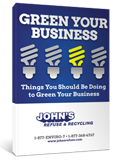How Do I Know If My Waste is Hazardous?

If your company is having difficulty deciding what is and what isn’t hazardous waste, there are ways to determine this. Even homeowner’s with their own private environmental waste will need to know if what they are disposing of is hazardous or not. The RCRA, or Resource Conservation and Recovery Act, determines first if it is solid waste. Solid waste doesn’t have to be “solid” but it must be no longer in use for its intended purpose or a material item that needs to be reclaimed before it is reused. Hazardous waste must first be solid waste before it can be deemed hazardous.
Some wastes are exempted from regulation as a hazardous waste. Items like used oil that is going to be taken to a recycling company and some household wastes are included in these exclusions. A knowledgeable person in waste removal services will know if your waste products are hazardous or not.
Next in determining whether you have hazardous waste is to find out if there is chemical or physical hazard to the waste product. These descriptions are listed in greater detail in 40 CFR Part 261 Subpart D of the Hazardous Waste code. There can be F-listed, K-listed, or P- and U-listed wastes.
F-Listed
Wastes from non-specific sources like halogenated solvents.
K-Listed
Wastes are those from specific sources like the K062 waste-spent pickle liquor left behind by steel finishing operations.
P- and U-Listed
Wastes are wastes that are unused commercial chemicals, discarded chemical products, container residues, spill residues, and off-specification products.
Lastly, determine if you can say yes to any of these questions:
- Is it ignitable?
- Is it corrosive?
- Is it reactive?
- Is it toxic?
A yes to any of these questions will determine that it is indeed hazardous waste. Waste removal of any hazardous waste products are going to be more costly due to the added regulations and the danger of disposal.
Key Takeaways
- Hazardous waste must be a solid waste first.
- Oil that is to be recycled is exempt from the hazardous waste regulation.
- Items that are ignitable, corrosive, reactive, or toxic are always hazardous waste products.
Need Help?
[Free eBook] Things You Should Be Doing to Green Your Business
In Johns’ new ebook, we provide you with the latest and most effective ways to make your business more environmentally friendly. These practices are free of cost and will actually save you money!

